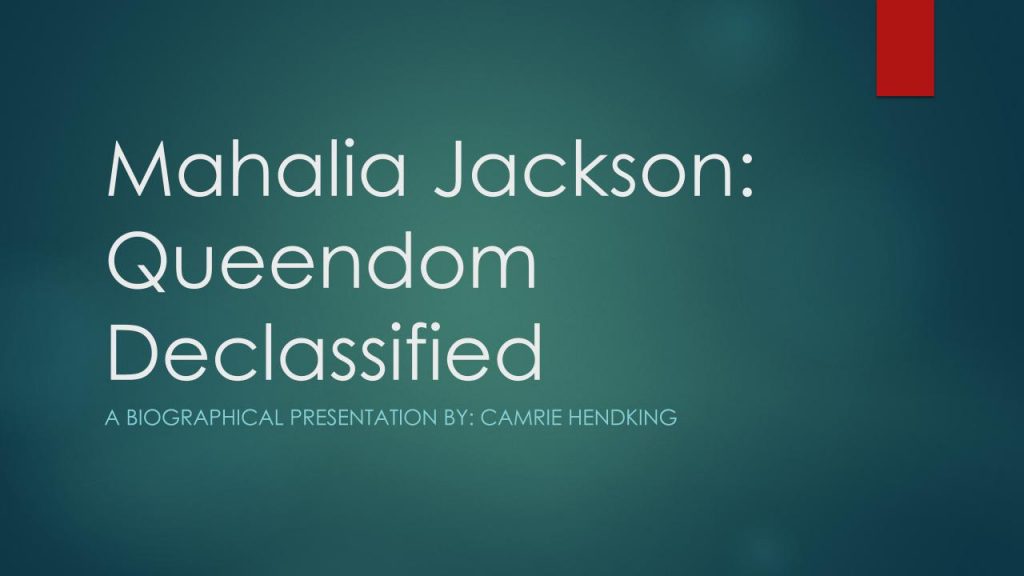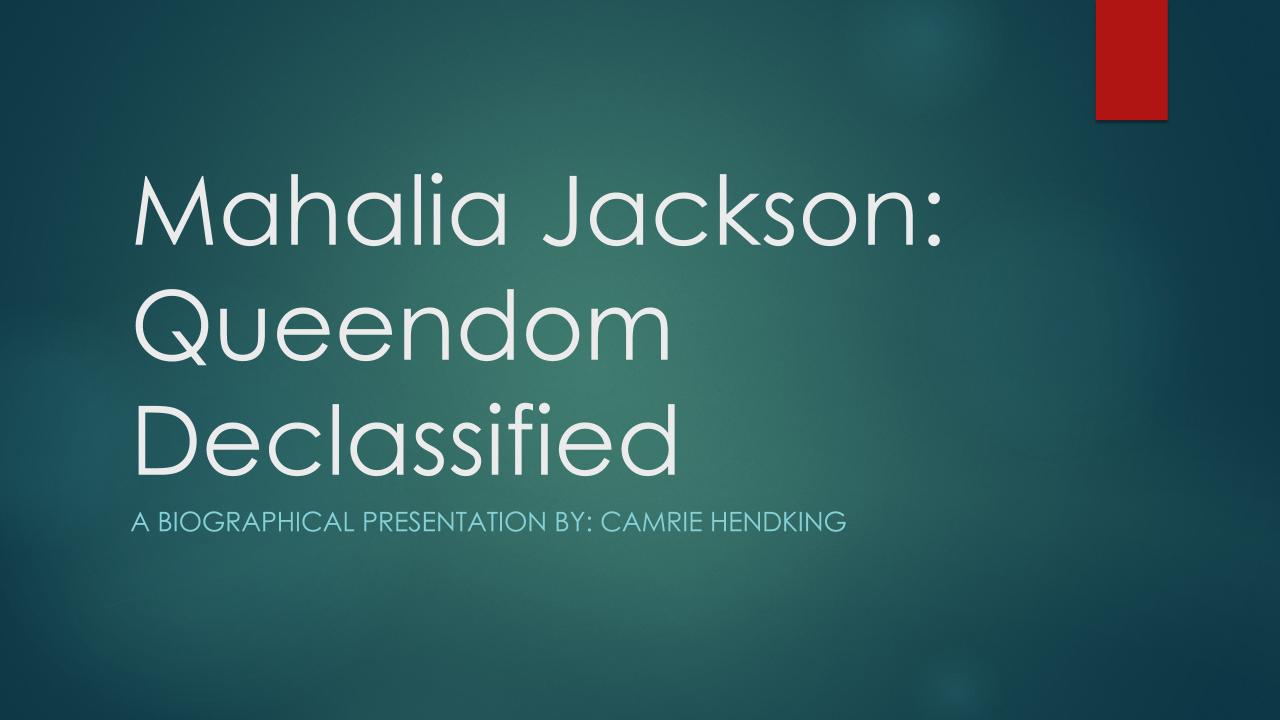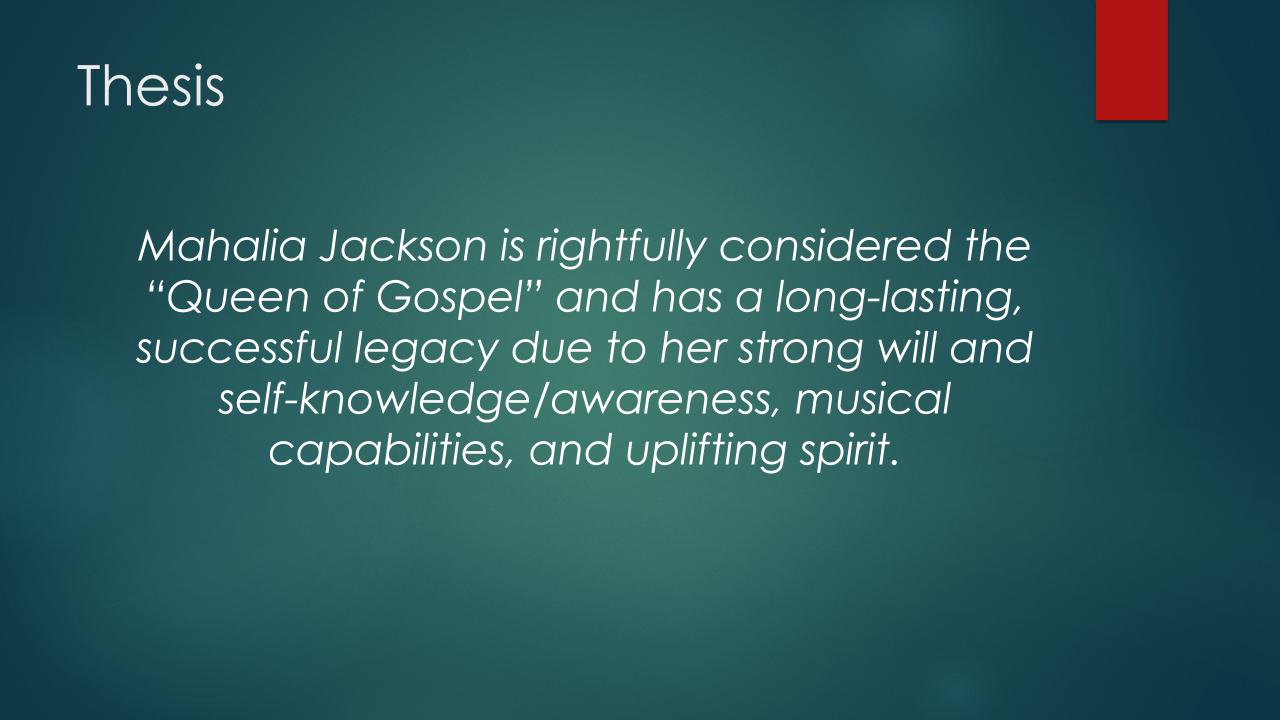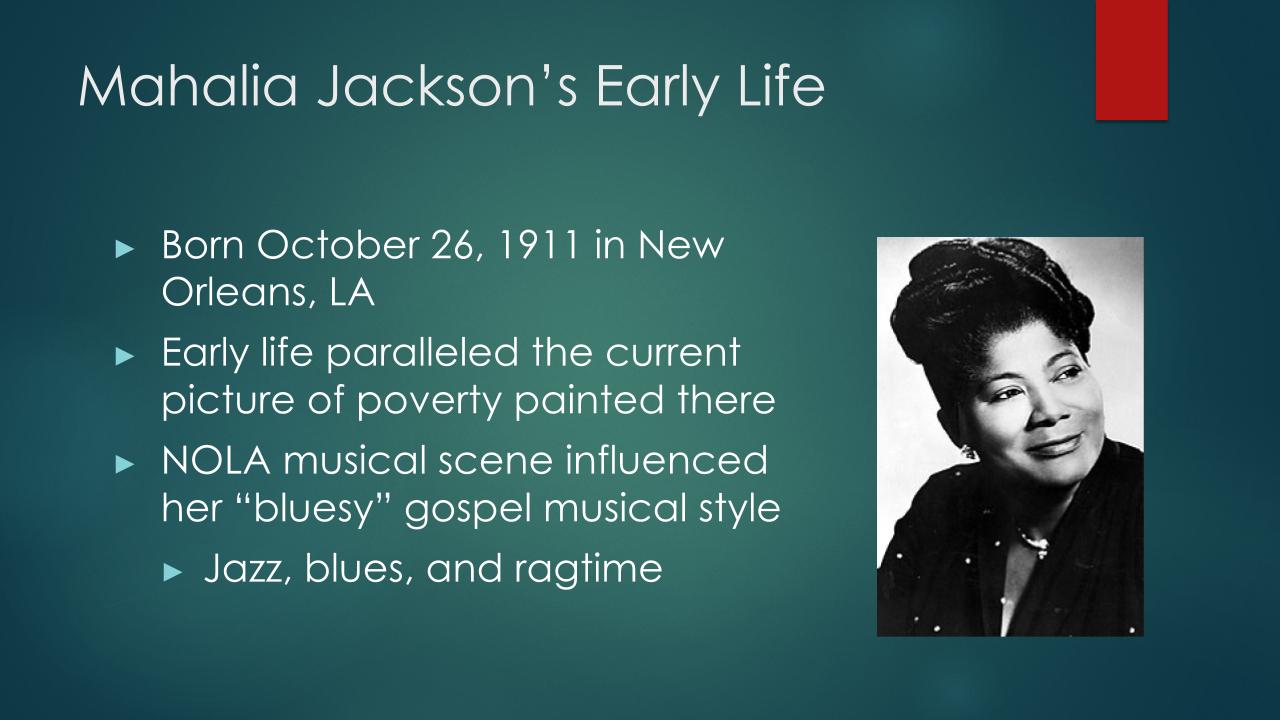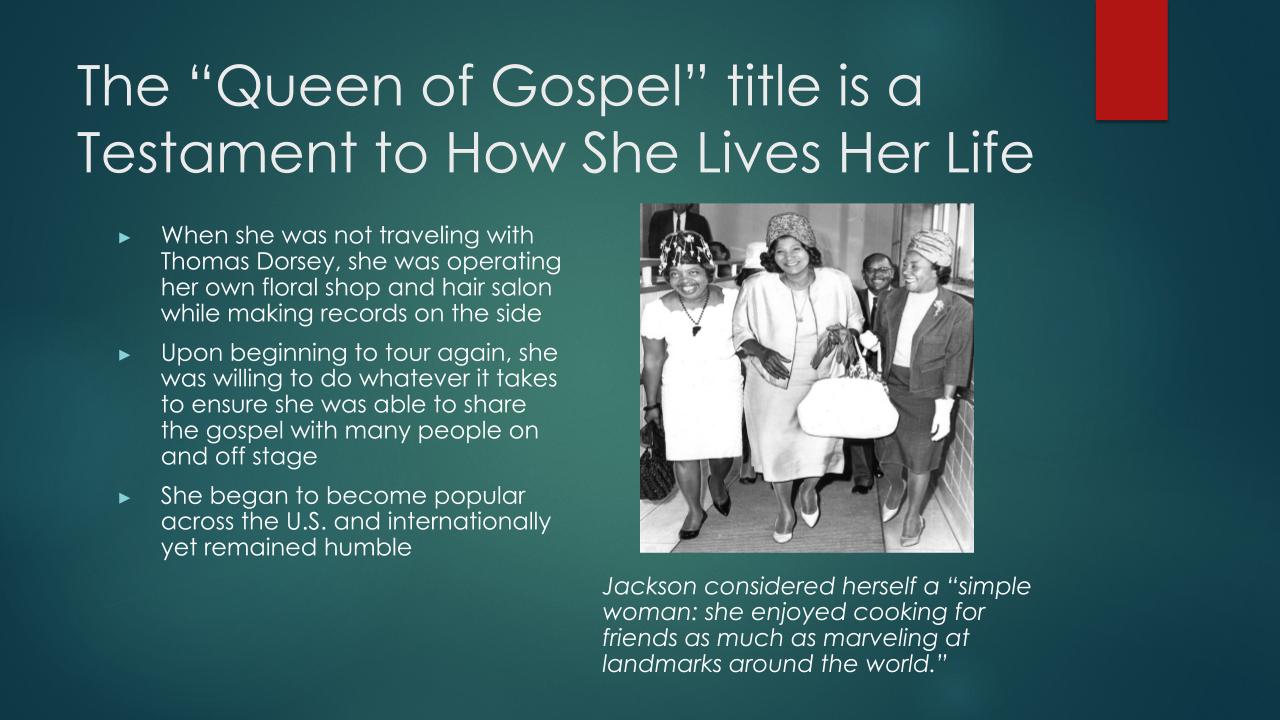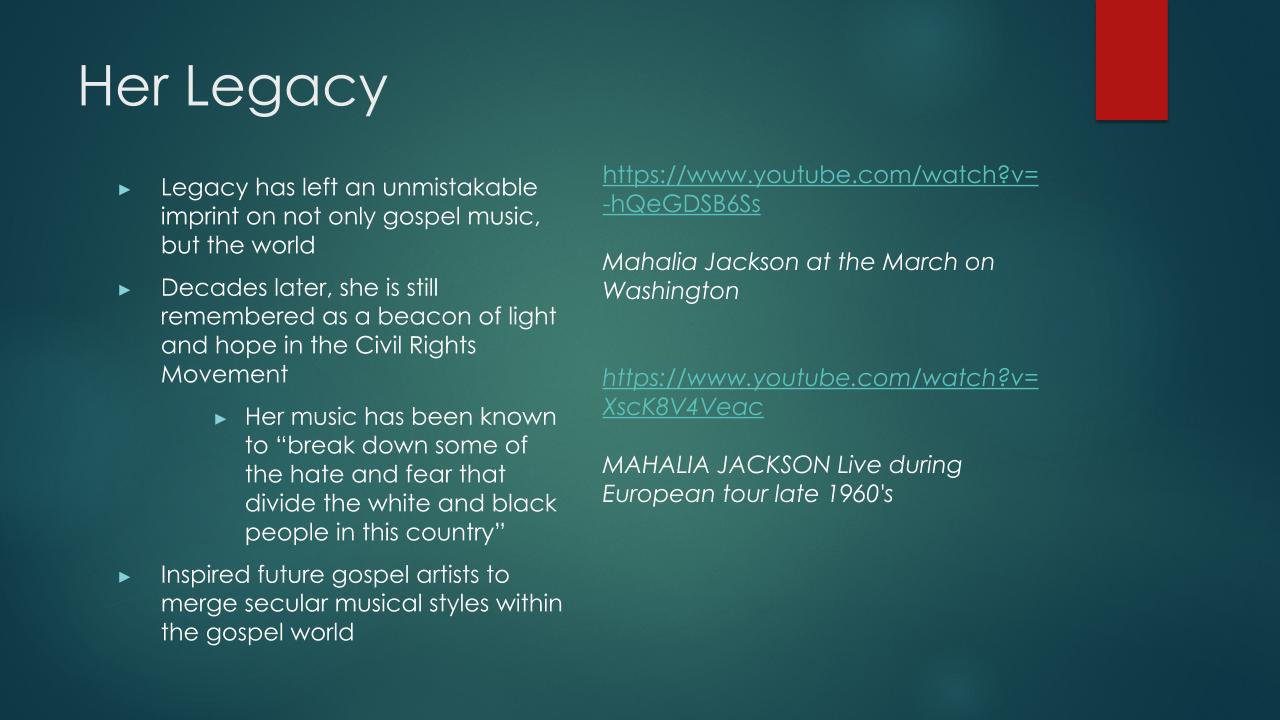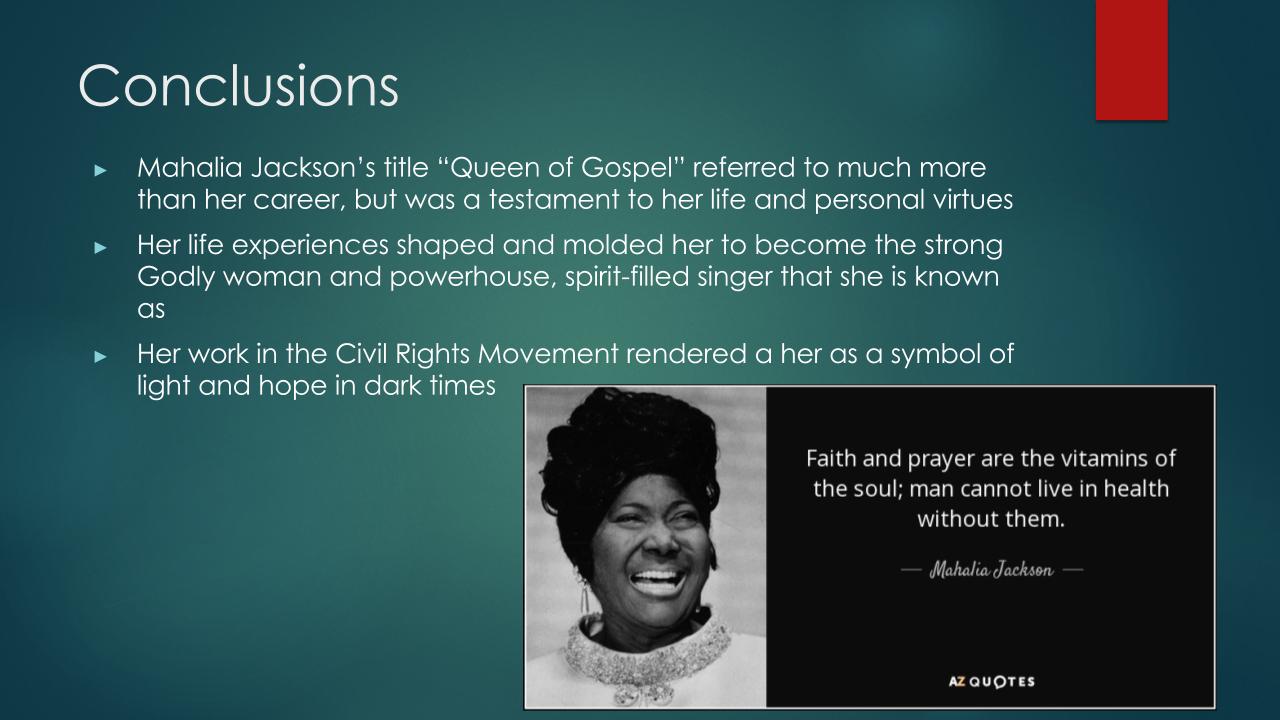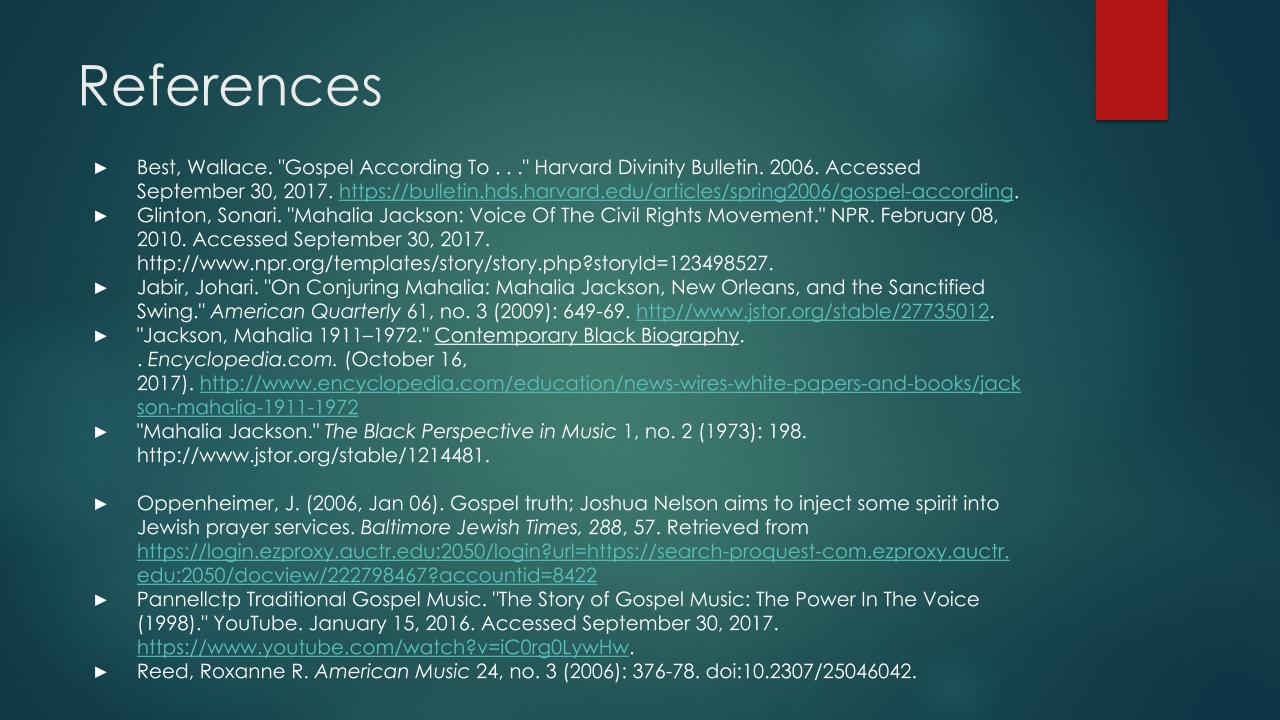Title: Mahalia Jackson: Queendom Declassified
OUTLINE
Research Methodology: After reading about Mahalia Jackson both in the textbook and through several scholarly sources, it became obvious that Jackson’s role as the “Queen of Gospel” is very multifaceted. From this title, I attempted to unpack the different qualities, both personally and professionally, that led to her widespread success and fame. By unpacking and understanding her life and life experiences, it can be seen how her experiences impacted her music career and development as a Godly woman, which increased her abili8ty to reach a wide array of audiences.
Thesis statement: Mahalia Jackson is rightfully considered the “queen of Gospel” and has a long-lasting, successful legacy due to her strong will and self-knowledge/awareness, musical capabilities, and uplifting spirit.
- Background/Early Life History
- Birth place: New Orleans; Year: 1911
- Growing up in New Orleans influenced to her “bluesy” gospel sound
- She was greatly influenced by the jazz, blues, and ragtime musical influences of her time.
- Birth place: New Orleans; Year: 1911
- Early life paralleled that of the current picture of poverty painted of New Orleans
- “Her choice to sing gospel music did not strip the influences of secular music from her style.” (Jabir)
- “I know now that a great influence in my life was the Sanctified and Holiness churches we had in the South…Those people had no choir and no organ. They used the drum, the cymbal, the tambourine, and the steel triangle… They had a beat, a powerful beat, a rhythm we held on to from slavery days…I believe that the blues and jazz and even the rock and roll stuff got their beat from the Sanctified Church.” (Mahalia Jackson)
- At the age of 16, she moved to Chicago, where she truly began to make a name for herself in the Gospel world
- Her life experiences and career as an artist in developed her character
- Mahalia’s music met great opposition at the onset of her career
- She earned her keep while in Chicago as a clothes washer for white people, charging $1 per day.
- In that time period, Black churches in Chicago where seen as a “mechanism by which blacks could be made into respectable (Protestant) citizens.” (Jobir 652)
- Mahalia’s music met great opposition at the onset of her career
- The church functioned as a “black Protestant project” where Black choirs were directed by classically trained musicians.
- This lead to the sound of the Black church in Chicago being that of “performing a mastery of European classical choral music and arranged spirituals.”
- When Mahalia finally found a church whose music spoke to her (Greater Salem Baptist Church), she joined, auditioned for the choir, and became a lead singer. She then joined a quintet that performed throughout the city.
- In 1934, she received $25 for her first recording, entitled “God’s Gonna Separate The Wheats From The Tares”
- These experiences forced Jackson to really discover what she wanted her “sound” to be. Would she let the opposition of the church sway her from adding the swing and blues styles that she carried in her spirit from her childhood experiences in New Orleans? Or would she continue on in spite of the opposition. She continued to sing in the style that she loved, which showed her perseverance and strong will to stand for what she believes, a trait that was seen not only in her musical career, but in her political involvement as well.
- Temptation of the Blues
- The historic issue of Gospel artists attempting to make more money by crossing over also affected Mahalia Jackson.
- The Great Depression had devastating impacts on people all across the country, but Jackson knew that she could earn more money by singing songs outside of the Gospel realm.
- Coming from an extremely religious family, this created an internal conflict for Mahalia Jackson. As a young girl in growing up in New Orleans, she was always enchanted by the swing and blues style of music. However, her extremely religious family considered that music unholy and impious.
- Mahalia Jackson’s grandfather, to whom she was extremely close, was struck down by a stroke leaving him in a coma. In that moment, Jackson vowed that if her grandfather recovered, she would never even enter a theatre again, let alone sing songs her grandfather would not approve of.
- As her career progressed, she continually turned down lucrative night club requests, and she never went back on her vow.
- Specific cited example states that a Las Vegas night club offered her as much as $25,000 to sing and even promised to not serve whiskey at her performance. She still turned them down.
- While her family blatantly discredited blues music as antireligious, Jackson never did. Jackson stated that her inspiration derived from gospel, not blues music.
- “There’s no sense in me singing the blues, because I just don’t feel it… In the old, heart-felt songs, whether it’s the blues or gospel music, there’s the distressed cry of a human being. But in blues, it’s all despair; when you’re done singing, you’re still lonely and sorrowful. In the gospel songs, there’s mourning and sorrow, too, but there’s always hope and consolation to lift you above it.” (Mahalia Jackson to Harper’s Magazine in 1956)
- The title “Queen of Gospel” is a testament to how she lived her life for God’s glory both on and off the stage
- Along with Thomas Dorsey, considered the Father of Gospel, Mahalia Jackson performed at various churches and “gospel tents.”
- By performing with such a renowned composer, her reputations as a singer and gospel singer interpreter grew.
- After touring with Dorsey, Jackson returned to Chicago to open her own beauty salon and flower shop.
- Through these small business, she drew a strong base of customers and clients from gospel and church communities, which provided her a way to continue to have a presence in those communities, even while she was not making music. This is a testament to her ability to captivate her audiences on a spiritual level, no matter what arena they may be in.
- On the side, Jackson continued to make records that were of very little monetary award. However, while she was practicing in a studio, a representative from Decca records overheard her and advised her to record an old spiritual she learned as a child (Move On Up A Little Higher). This recording sold like wildfire in several areas. It sold 100,000 copies overnight and very quickly passed the two-million mark.
- The Negro press soon began to hail Jackson as ‘the only Negro who Negroes have made famous.”
- During that time period, it was not often seen that a famous musician was made famous via the African American community. This shows the increasing in African American upward mobility in the Northern states.
- Upon beginning to tour again, she was willing to do whatever it takes to ensure that she was able to share the gospel
- Mahalia Jackson rented a Cadillac that she slept in whenever her tours brought her to places where hotels would not allow blacks to lodge. She also stored food in the car so that she was able to eat when she came across restaurants that would not serve blacks.
- Mahalia Jacksons stayed true to who she was and WHOSE she was during every performance
- Cited Example: While performing to a packed house of white and black patrons at Carnegie Hall, Jackson recounts how she got carried away with the jubilant audience (some would say she was caught up in the Spirit). She cites that she found herself on her knees singing for them, and she had to straighten up and say “Now we best remember that we are in Carnegie Hall and if we cut up too much, they may put us out.”
- This funny statement, in all its authenticity, only captivated her audiences even more. It is also interesting to note that phrases like these continue to dominate in the Black church setting. This demonstrates that she was not ashamed to let the Spirit use her and to be caught up in the Spirit during her performances.
- Mahalia Jackson begin to become equally as popular internationally as she was here in the United States.
- She performed for royalty and fans in France, England, Denmark, Germany.
- Even as she began to grow more popular, she did not resort to singing different genres of music.
- She was also able to sing in Israel to a mixed crowd of religions, including Jews, Christians, and Muslims.
- From the current optic of present day America where it seems virtually impossible for people of different denominations, yet alone different religions, to come together and be on one accord, this is tremendous.
- This speaks not only to her ability to captivate other audiences, but how she puts God first in her performances, which was a major contributor to her success worldwide.
- From the current optic of present day America where it seems virtually impossible for people of different denominations, yet alone different religions, to come together and be on one accord, this is tremendous.
- She performed for royalty and fans in France, England, Denmark, Germany.
- Cited Example: While performing to a packed house of white and black patrons at Carnegie Hall, Jackson recounts how she got carried away with the jubilant audience (some would say she was caught up in the Spirit). She cites that she found herself on her knees singing for them, and she had to straighten up and say “Now we best remember that we are in Carnegie Hall and if we cut up too much, they may put us out.”
- The Negro press soon began to hail Jackson as ‘the only Negro who Negroes have made famous.”
- Along with Thomas Dorsey, considered the Father of Gospel, Mahalia Jackson performed at various churches and “gospel tents.”
- This bled over into her involvement in the Civil Rights Movement
- Participated in Civil Rights Movement
- Sang at the historic March on Washington before Martin Luther King, Jr., gave his “I Have A Dream” speech.
- The Civil Rights Movement and the Black church during this time period were very much intertwined, leading to the prominent theme of Baptist and Missionary Baptist churches having a social justice focus.
- Through all that she achieved, she continued to have a humble spirit.
- Jackson considered herself a “simple woman: she enjoyed cooking for friends as much as much as marveling at landmarks around the world.”
- Her Legacy has left an unmistakable imprint on not only Gospel, but the world.
- Joshua Nelson, a young black Jew who was first introduced to gospel by Mahalia Jackson, set out to change the way traditional services were in the Jewish religion.
- He felt they were too boring, and set out to infuse music styles similar to that of Mahalia Jackson.
- As a singer himself, he was greatly inspired by Mahalia Jackson and her style.
- Decades later, she is still remembered as a shining beacon for the civil rights movement
- Her music has been known to “break down some of the hate and fear that divide the white and black people in this country”
- Joshua Nelson, a young black Jew who was first introduced to gospel by Mahalia Jackson, set out to change the way traditional services were in the Jewish religion.
Bibliography
Best, Wallace. “Gospel According To . . .” Harvard Divinity Bulletin. 2006. Accessed September 30, 2017. https://bulletin.hds.harvard.edu/articles/spring2006/gospel-according.
Glinton, Sonari. “Mahalia Jackson: Voice Of The Civil Rights Movement.” NPR. February 08, 2010. Accessed September 30, 2017. http://www.npr.org/templates/story/story.php?storyId=123498527.
Jabir, Johari. “On Conjuring Mahalia: Mahalia Jackson, New Orleans, and the Sanctified Swing.” American Quarterly 61, no. 3 (2009): 649-69. http//www.jstor.org/stable/27735012.
“Jackson, Mahalia 1911–1972.” Contemporary Black Biography. . Encyclopedia.com. (October 16, 2017). http://www.encyclopedia.com/education/news-wires-white-papers-and-books/jackson-mahalia-1911-1972
“Mahalia Jackson.” The Black Perspective in Music 1, no. 2 (1973): 198. http://www.jstor.org/stable/1214481.
Oppenheimer, J. (2006, Jan 06). Gospel truth; Joshua Nelson aims to inject some spirit into Jewish prayer services. Baltimore Jewish Times, 288, 57. Retrieved from https://login.ezproxy.auctr.edu:2050/login?url=https://search-proquest-com.ezproxy.auctr.edu:2050/docview/222798467?accountid=8422
Pannellctp Traditional Gospel Music. “The Story of Gospel Music: The Power In The Voice (1998).” YouTube. January 15, 2016. Accessed September 30, 2017. https://www.youtube.com/watch?v=iC0rg0LywHw.
Reed, Roxanne R. American Music 24, no. 3 (2006): 376-78. doi:10.2307/25046042.

